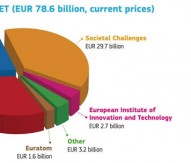
Destination: Horizon 2020
Horizon 2020 charts a new course in the EU’s investment in research, development and innovation. The programme will formally begin on 1 January 2014 and will replace the existing Seventh Framework Programme.
Horizon 2020 will focus on creating jobs, boosting growth and addressing the long-term concerns facing EU citizens; it will also aim to strengthen the Union’s global position in RDI. The framework programme is the financial instrument implementing the Innovation Union, a flagship initiative of Europe 2020, which is dedicated to generating smart, sustainable and inclusive economic growth over the next ten years. Horizon 2020 will also support the objectives of the European Research Area, which centres on developing a single market for knowledge, research and innovation.
Horizon 2020 introduces new coherency to RDI funding by bringing together the elements of three existing EU programmes, namely the Framework Programme for Research and Technical Development, the innovation related activities of the Competitiveness and Innovation Framework Programme, and the European Institute of Innovation and Technology (EIT). The new programme will have a bigger budget than its predecessors and will receive funding worth €78.6bn in today’s prices. Horizon 2020 will also be simpler by encompassing a single set of rules for participation and a single reimbursement rate for eligible direct and indirect costs. The programme will also cover the entire ‘lab to market’ process, especially focusing on the infamous ‘valley of death’.
Horizon 2020 is structured around three core pillars, subsequently divided into a variety of objectives and challenges:
Excellent Science (~€24.4bn)
- European Research Council;
- Marie Skłodowska-Curie Actions;
- Future and Emerging Technologies; and
- Research infrastructures (including e-infrastructures).
Industrial Leadership (~€17bn)
- Leadership in enabling and industrial technologies
- Key Enabling Technologies, namely advanced materials, advanced manufacturing and processing, biotechnology, ICT; micro and nanoelectronics, photonics, and nanotechnology;
- Space research.
- Access to risk finance; and
- Innovation in SMEs.
Societal Challenges (~€29.7bn)
- Bioeconomy;
- Climate action;
- Energy;
- Health;
- Transport;
- Inclusive, innovative and reflective societies; and
- Secure societies.
Member states and third countries
Horizon 2020 will automatically be open to all 28 EU member states, although countries outside the Union will also be able to join the framework programme through an association agreement or an agreement with a third country. Countries will be able to participate in one of three groupings, namely: enlargement and neighbourhood countries, which will be eligible for automatic funding; developing countries, which are eligible for automatic funding; and industrialised and emerging economies, which will only receive funding under specific conditions. Non-EU countries will need to fulfil certain criteria and sign an agreement with Brussels before participating.
European Institute of Innovation and Technology
Supporting the objectives of the three pillars is the EIT. The body will receive €2.7bn in funding and aims to increase Europe’s competitiveness, encourage sustainable economic growth, increase the continent’s innovation abilities, and create the environment to develop tomorrow’s entrepreneurs. The institute’s funding will be directed towards the Knowledge and Innovation Communities (KICs), an integrated knowledge triangle of higher education, research and innovation. At present, three KICs are under operation, namely Climate-KIC, EIT ICT Labs and KIC InnovEnergy, and there are five new KICs proposed: Healthy living and active ageing; Raw materials; Food4Future; Added value manufacturing; and Urban Mobility.
The Joint Research Centre is the Commission’s in-house science centre and provides scientific and technical support to EU research policy making activities. As part of Horizon 2020, the JRC will focus its direct actions on the societal challenges as well as aid its contributions to nuclear research under the EURATOM Treaty.
Innovation Investment Package
Horizon 2020 includes a range of partnerships with industry and the public sector to help deliver on its innovation and economic growth aims. Supporting the framework programme is the €22bn Innovation Investment Package (IIP), which will help fund innovation in sectors that deliver high quality jobs. The IIP is formed of the five JTIs, four Joint Programmes, and a Joint Undertaking.
The Joint Technology Initiatives (JTIs) are specialised public private partnerships between the Commission and industry. Under Horizon 2020, three JTIs will be enhanced (Innovative Medicines Initiative, Fuel Cells and Hydrogen and Clean Sky), whilst a further two will be merged (ARMETIS and ENIAC to create the Electronic Components and Systems). A fifth JTI will be launched focusing on renewable natural resources and innovative technologies under the title of ‘Bio-based Industries.’
Also introduced is the SESAR (Single European Sky ATM Research) Joint Undertaking, another form of PPP dedicated to ‘the efficient execution of Community research, technological development and demonstration programmes,’ according to the Commission. Linked to the Clean Sky JTI, it will focus on modernising the European air traffic management system as part of the Single European Sky.
Several public-public partnerships (PuPs) will also be developed as part of IIP. Created between the Commission and member states, these Joint Programmes include the second ‘European and Developing Countries Clinical Trials Partnership,’ a follow-up ‘European Metrology Programme for Research and Innovation,’ and Eurostars 2. Also being enhanced is the existing ‘Active and Assisted Living Research and Development Programme’.
ERA-Nets, EIPs, ETPs and JPIs
Contractual public private partnerships complement the JTIs and give industry the opportunity to have direct input into the preparation of Horizon 2020 work programmes, as well as defining research roadmaps and having a focus on close to market activities. Sectors benefitting from contractual PPPs between the Commission and industry include green vehicles, robotics, and ‘photonics’.
Assisting PuPs in the preparation, implementation and co-ordination of joint activities is the ERA-Net instrument. The existing ERA-Net and ERA-Net Plus will be merged under Horizon 2020 and the focus will move to top-up funding of single joint calls for transnational R&I areas relevant to the framework programme.
European Innovation Partnerships (EIPs) are a flagship initiative of the Innovation Union. The five EIPs help increase the impact of actions funded under the framework programme and will assist in defining relevant work programmes, whilst Horizon 2020 will contribute to achieving the aims of the specific EIPs. The partnerships are challenge-driven, focusing on societal benefits and a rapid modernisation of the associated sectors and markets.
European Technology Platforms (ETPs) are led by industry, but also include the participation of academia. Currently, 38 are in operation and focus on ensuring that EU research has a high impact in leading markets and technological sectors. The Commission will consider the advice of ETPs in the continued development of Horizon 2020, whilst the platforms will encourage industry participation in the framework programme. The Commission has specified that ETPs should be aligned with priorities of Europe 2020 and aim to address a Horizon 2020 societal challenge.
Joint Programming Initiatives (JPIs) assist member states to voluntarily align national research agendas to help address key challenges facing European society. The ten JPIs will support the work of Horizon 2020 where an overlap in research occurs and it is envisaged that the initiatives will lead to quicker and greater research results at supranational level, whilst reducing duplication at national level.




